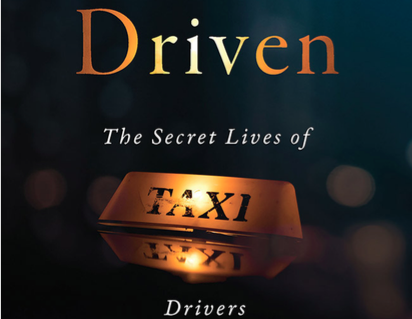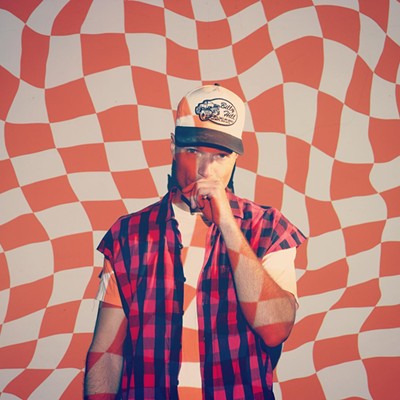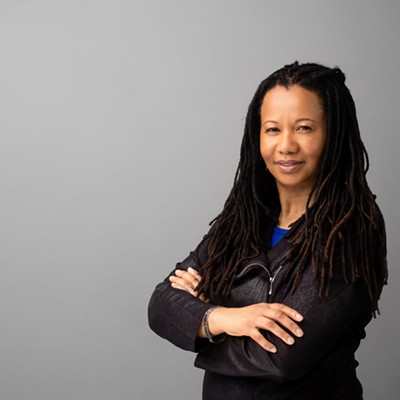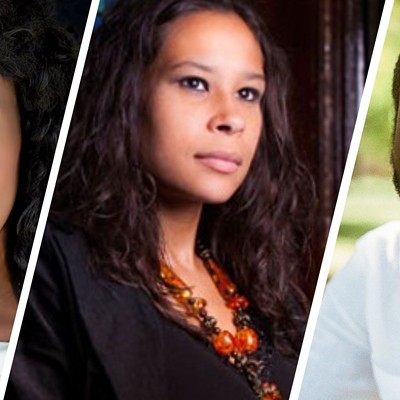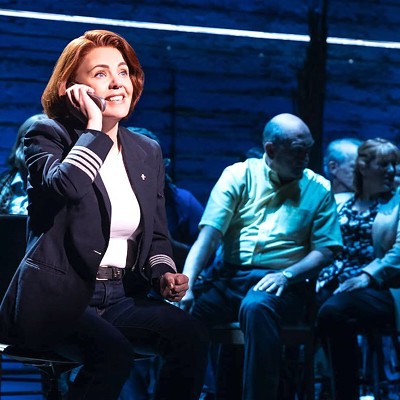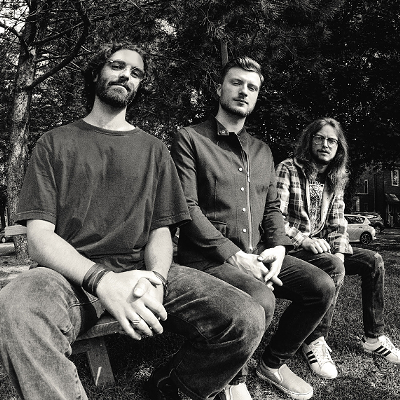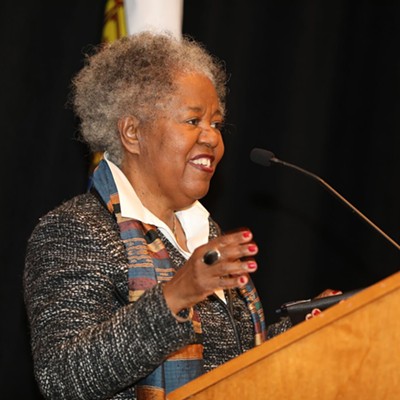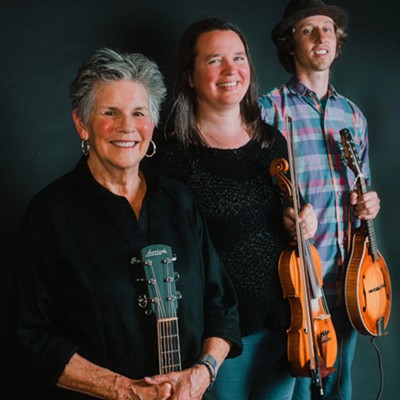The Man with the Plan
I spoke to many drivers who had watched their countries destroyed and just wanted to survive. These cabbies didn’t just feel the social and political reverberations of war from afar in their taxis, they’d felt the literal rumble of bombs in their bodies. I doubt there’s an armed conflict anywhere in the world unrepresented by a Canadian taxi driver. In one way or another, men with guns had invaded the personal lives of most cabbies I spoke to. Some drivers bore arms themselves. All of them bore scars. And none had more obvious scars than Michael Sillah Kamara.
Michael met me at my Halifax B&B on an exceptionally frigid February evening after one of his cab-driving shifts. The B&B owner had made it clear that all guests must leave their shoes in the entryway before heading up to the rooms, but when I asked Michael to take off his boots he just smiled. “It is difficult for me,” he said. “Because of my leg.”
In December 1998, boys with guns attacked Komrabia N’jla, Michael’s home village, located about thirty kilometres from Freetown, Sierra Leone’s capital. The rebels took up positions around the village, then they started to shoot. “You see bullets going like fire,” Michael said. “Like how rain is coming.” Weeks earlier, rebel forces had crossed over the border into Sierra Leone from Liberia and started their westward march to the capital, Freetown. The rebels looted and destroyed every village they passed through. They set homes on fire. They abducted children, and raped women and girls. They drugged young men and forced them into their ranks. The villagers understood what the rebels’ assault would bring, and they panicked.
Michael was in his mid-teens at the time. If he were captured, the rebels would either kill him or conscript him. He scrambled out a window and ran towards the surrounding forest. He had nearly reached the treeline when he heard a rebel shout at him to stop. He didn’t, and a bullet blasted through his left leg just below the knee. Somehow Michael continued to run. Fear and adrenaline kept him on his feet for two miles, he said, before he collapsed on the forest floor. He lay there for two days, bleeding and praying, until Sierra Leonean soldiers found him. They brought him to a government hospital in Freetown. Doctors could not treat Michael’s wound. He’d lain in the bush too long and an infection had set in. They amputated his leg.
Considering the horrors that would descend on the capital in the days
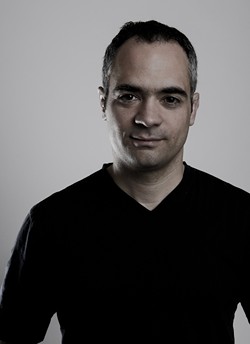
that followed, Michael’s surgical amputation seems, in retrospect, a strange mercy. He was lucky to be safely recovering in a hospital bed on January 6, when the war came to Freetown. Villagers who’d escaped the advancing rebels fled to the capital, where they believed government soldiers and Nigerian-led peacekeepers would keep them safe. “But the rebels entered anyway,” Michael said. “That was the dark day of our city.”
The rebels launched a murderous assault on Freetown, which they named “Operation No Living Thing.” Commanders with monikers like Mosquito and Superman ordered their charges to empty the city’s prisons, set police stations ablaze, and lay siege to government military positions. They killed entire families at a time, often burning them alive in their homes or cars. They massacred men, women, and children in churches and mosques. They gouged out eyes and flung people off rooftops. Rebels kidnapped girls as young as eight years old and, in the words of a rebel who later testified at trial, “used them as women.”
From his hospital bed, Michael couldn’t see the bloody streets of Freetown another mercy—but he could hear the boom of bombs dropped on rebel positions by Nigerian Alpha warplanes and helicopter gunships. The rebels started to withdraw from the city after two weeks of street battles. They’d lost many men during the fighting and craved revenge. “Those that remained were like wounded lions,” Michael said. “They won’t spare anyone they see now.” The rebels hacked and slashed their way out of the capital and set entire city blocks on fire.
The rebels amputated limbs from twenty thousand civilians. For each that survived their wounds, three died from blood loss, infection, or shock.
The chaos in Freetown makes an accurate accounting of civilian deaths impossible. A Physicians for Human Rights report claimed at least five thousand civilians were killed during the occupation of the city, while the government’s senior pathologist registered more than 7,300 burials. The most visceral reminder of that January in Freetown isn’t a cold ledger of fatalities, but the mutilated survivors that remain. “You will not go two or three steps in Freetown without seeing a man who lost his hand or foot from the war in the country,” Michael told me. Past violence exists in the present on Freetown’s streets. “All those people who suffered from the war must finish dying before it becomes history,” Michael said. “They are everywhere.”
Michael stayed in the hospital for two months. He laughed when I asked him if his family came to visit him. “War separates people. War makes you forget about other people. You just try to get yourself to a safe place. If you have kids, you go with your kids. But everyone else runs for themselves,” Michael said. “War is no good. War is definitely no good.”
Michael thrived at Aberdeen. The camp offered refugees various training courses, and Michael enrolled in a tailoring program. The job suited him. Michael had apprenticed in a tailor shop back in Komrabia N’jla, where he’d learned basic stitches and earned the occasional dollar from his “boss man.” “In the camp, tailoring is one of the things God blessed me with,” Michael said. After he opened his own shop in Aberdeen, tailors who’d lost hands during the war started to visit. They longed to work with cloth and thread again, but felt their amputations had killed their careers. “They were discouraged,” Michael said. “When they lose their one hand they say ‘This is the hand I was using the scissors to cut. I am not able to cut again.’”
Michael decided to gather the tailors together and retrain them. His efforts drew the attention of Cause Canada, a humanitarian organization working at the camp, which provided sewing machines and paid Michael to give tailoring workshops to amputees. The Cause Canada project ended after six months, but Michael kept his tailor shop running. He worked alongside the tailors he helped train, and they earned a little money sewing clothes for customers in the camps. “I have a lot of friends that came back to life,” Michael said. “You are able to do the job that you know before. And you are able to get small, small money out of it. And you can feed your family.” During his time at Aberdeen, Michael trained and retrained more than twenty fellow amputees and their children to be tailors.
The Cause Canada program aimed to give the camp’s amputees the skills and training to function outside Aberdeen’s boundaries. But Canadian occupational therapist Quentin Ranson, who met Michael in the fall of 2000, found that many amputees became completely dependent on the camp’s material offerings.
Michael was just as keen as his fellow amputees to take advantage of whatever short-term opportunities came to him at Aberdeen, but he didn’t believe he could build a life out of the camp’s donation economy. “Michael stood out,” Quentin said. “He had entrepreneurial spirit. Self-driven.” Quentin believes that Michael would’ve become the CEO of a successful business had he been born just about anywhere else.
When Michael learned that Quentin planned to return to Edmonton for Christmas, he had a proposition. Michael asked if Quentin knew anyone in Canada who might be interested in buying the sorts of clothing he made. If so, Quentin could ask them to email their measurements to him in Sierra Leone. Michael would make the clothes in Aberdeen and send them to Canada with Quentin , who would sell them to his friends. Quentin could use the profits to buy Michael a camera, then bring the camera to Freetown after his Christmas break. Quentin agreed. He travelled to Canada with twelve custom-made skirts and returned to Sierra Leone at the beginning of 2001 with a camera for Michael.
Michael found time to locate the surviving members of his family in other displacement camps. During tearful reunions with his parents and siblings, he learned that his home in Komrabia N’jla had been looted and destroyed by rebels. They killed several family members, including two of his twelve siblings. But a new family had grown around Michael in Aberdeen. He met and married Hannah, whose mother had lost her arm to a rebel machete. He also gained a five-year-old nephew, Mark, whom Michael’s sister had entrusted into his care. “In Africa it is common,” Michael said. “They born too many kids. They give them away so other people can help with the responsibility.” By the time he was nineteen, Michael had a wife and a young child to care for.
And he wanted to bring them to Canada. All Michael knew about the country was that he wanted to go there. “Just because of Quentin,” Michael said. “He is so nice, I thought that everything is nice in Canada.” Michael and his friend Joseph Largawo approached Quentin for assistance. They weren’t the first or last of the amputees to ask Quentin for immigration help, but Michael was one of the only people at Aberdeen who Quentin believed could thrive outside the camp. Still, Quentin felt conflicted abetting their immigration. Michael and Joseph’s departure from Aberdeen would deprive the camp of their strongest advocates and leaders. “I quickly realized it wasn’t my place to decide that on their behalf,” Quentin said. “It wasn’t something I had a right to influence.”
Quentin brought Canadian refugee application forms for Michael and Joseph. He told them they would have to fill out the forms themselves, and send them to the Canadian Embassy in Ghana, the closest embassy to Freetown, rather than to Ottawa directly. Michael remembers Quentin being clear and firm with them. “Quentin said, ‘Mail this. Don’t joke. Mail it. I am not sure if they will approve you guys. But mail it.’”
Michael and Joseph didn’t mail it. “We did not take it serious,” Michael said. Two months passed before Michael and Joseph showed the documents to a pastor who was visiting the camp. The pastor was appalled that the men had been sitting on the completed documents for so long. He scolded them for their hesitation and helped them gather enough money to cover the postage. Then he asked Michael if he could add his own name to the application. Michael told him, simply, that there was no room left on the form.
The pastor’s interest finally convinced Michael of the importance of the Canadian documents. From then on, he refused to let the papers out of his sight. “We are not going to give these forms to anyone,” Michael said to Joseph. “If someone wants to post it for us, we will hold on to it and say ‘You bring us to the place.’” The two men walked to the post office together. “We walk foot to foot. Foot to foot,” Michael said. “They charge us. We post it. They send it.” Then Michael abruptly forgot about the forms.
Eight months later, in April 2002, while in Freetown to purchase tailoring materials for his shop, Michael saw a UNHCR truck driving up the road towards Aberdeen. Michael knew the truck would cause excitement at the camp. The UNHCR vehicle had left by the time Michael returned from town, but one of his tailoring students told him two officials came looking for him. The men returned in the evening. They introduced themselves to Michael and told him to bring his family, and Joseph’s family, to their office the next day for an interview. Their refugee applications were being considered, and the officials needed Michael and Joseph to confirm everything they had written on their original forms.
Because Michael and his family still lived in Sierra Leone, the UNHCR did not consider them refugees. The commission transferred their case to the International Organization for Migration, a UN partner organization. The wheels of such organizations grind forward slowly. By the time IOM summoned Michael to its Freetown office to tell him his family’s visas were ready, nearly three years had passed. Michael was at that point splitting time between Aberdeen and a house in Masiaka, a town east of Freetown, provided by a Norwegian refugee agency. He lived at Aberdeen during the week so he could continue his tailoring work and his training with the soccer team, and spent his weekends with his family in Masiaka. Many resettled amputees like Michael lived in Aberdeen part time for fear they might miss out on the opportunities the camp offered.
The IOM official asked when Michael wanted to leave. “Right now,” Michael said. “Put us inside a plane and we’ll go.” The man told Michael his family needed a final medical check before flying to Canada. When Michael brought Hannah and Mark to the office the next morning, the official was shocked to see Hannah’s pregnant belly. “Why didn’t you tell us your wife was pregnant?” the man said.
“I didn’t know I was supposed to. I’ve been waiting, waiting, waiting.”
“How far along is her pregnancy?”
“Seven months,” Michael lied. Hannah was only a week from her due date.
The man shook his head and told Michael they would have to cancel the flight. Had the organization known about Hannah’s pregnancy sooner, they would’ve arranged for a nurse to accompany them on the flight to Canada. Now it was far too late. As it turned out, Michael and Hannah’s baby, a daughter they named Surria after Quentin’s wife, was born on the day of their original scheduled flight to Canada. Had their trip not been cancelled, she might have been born on the plane.
Michael and Hannah were heartbroken. The family had to start the refugee process all over again and would wait another two years before finally flying to Canada. They landed in Toronto on a bitter day in January 2007, nearly six years since first filling out their refugee-claim forms. The family stayed in a Toronto hotel for a couple of weeks before flying to Halifax. I asked Michael why the family chose Halifax. They didn’t. “There is an organization that welcomes refugees,” he said. “They do everything.They find a place for you. That’s the location they sent us. We have no option.”
The weather was horrible on the east coast when Michael and his family arrived. Almost every taxi driver I met who had come from somewhere else, especially from tropical climes, told a similar story of landing during the cold dead of winter. No one ever seems to arrive in Canada in the summer, as if there were an official government policy to cruelly haze new Canadians with bad weather.No one ever seems to arrive in Canada in the summer, as if there were an official government policy to cruelly haze new Canadians with bad weather.
tweet this
“That was a bad winter,” Michael said. “The thing is, when you come here newly, there are certain things that make you discouraged. One, you come and you have no family here. You miss your family. And two is the weather, especially if you come here during wintertime. It discourages you. And three, the food. You miss the food you used to eat.”
Eventually, Michael and Hannah learned where to buy familiar yams, cassava, and other ingredients that reminded them of home. The Kamara family has lived in Halifax for a dozen years now, but Michael still misses the feeling of community he left behind. “Back home you don’t have to call and make an appointment to come over. You just go and knock on the door and say ‘I am here. Open the door for me.’”
The discrimination didn’t bother Michael much, though. Many of the taxi drivers I spoke to shared his stoic response to racism. In fact, none mentioned their experiences with slurs or bigotry unless I asked first. In her research on racism in Toronto’s taxi industry, scholar Jessica Walters found that drivers tend to downplay incidences of everyday discrimination. Some cabbies are more apt to blame a passenger’s drunkenness, or bad mood, or some miscommunication about the fare or route—as if getting stuck in traffic warrants insulting a driver’s name or skin colour.
Cabbies become so desensitized to bigotry that they shrug off racist treatment as one of the hazards of the job. More a nuisance than a crime. “In Nova Scotia people are good, but you can’t say everybody should be good. People are nice here. Not everybody will be nice. Some will be stinky,” Michael said. “Some people say racist things. In any community, there is problem. I just focus on the good side.”
Despite the frustrations and challenges of pushing cab, the flexibility of the job allows Michael to make trips home to Sierra Leone every two or three years to visit family and friends for up to two months at a time.
On one of Michael’s trips, he met with a friend whose son suffered from a serious bone infection in his foot. The father, himself an amputee, could not afford the surgery that would save his son’s foot from being amputated. He asked Michael for help. When he returned to Halifax, Michael sent $500 of his taxi earnings to Sierra Leone for the surgery and doctors saved the boy’s foot. Michael continues to assist the family. “In September, when school opens, I will send money. They buy all the necessary things. They pay all the school fees for the school year. They buy books, pens, pencils, schoolbag, shoes,” Michael said. He feels compelled to help people because of the generosity he and his family received. “We are here because people helped us,” he said. “Today my kids are getting opportunity. They go to good schools. My family, we breathe well. We lie down in good conditions.”
Michael believes a person should never pass up a chance to do good, especially if that means saving a life.

